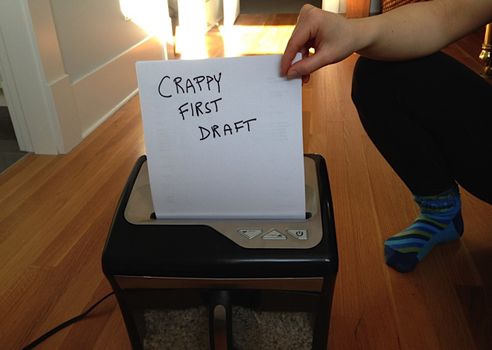Reading time: Less than 3 minutes
People often laugh when I use the phrase “crappy first draft,” but I’m serious about it. Producing one is exactly what will turn you into a professional writer…
Every beginning writer I know abhors the idea of a crappy first draft. It’s embarrassing, mortifying and humiliating. They know their boss or client is going to hate it. They’re going to hate it themselves because they fear it will make them look inept and unskilled. Thus, they don’t want to it exist on their hard-drive, even for a nanosecond.
If this is your belief, I’m here to tell you you’re wrong. You should LOVE your crappy first draft. You should worship it. You should seek to create it as soon as you possibly can.
There are five reasons why the crappy first draft is so important to writers:
- It will help you write faster. If your first draft doesn’t need to be perfect, you’ll be able to write in about half the time you normally take. (Really. Half the time!) Writing a crappy first draft means you don’t have to edit while you write. Many writers torture themselves, trying to squeeze exactly the perfect word or the best possible syntax out of each sentence. Poppycock! Instead, leave this faceting work for later: when you’re editing that crappy first draft. For seven ways to stopping editing while you write, see here. (My most useful tip? #6. Write yourself promissory notes.)
- It will make you feel better about yourself. No one ever does anything right the first time. Why should you be the worldwide exception to this law of human nature? We all make mistakes. And we all, inevitably, write crappy first drafts. Here’s how Anne Lamott puts it (although she uses the stronger epithet “shitty first drafts”): “All good writers write them. This is how they end up with good second drafts and terrific third drafts.” Feeling contented and self-confident — which is what you’ll be when you write faster — is essential to your progress. We don’t feel happy because we accomplish things. We accomplish things when we feel happy. Sean Achor speaks compellingly about this point. Do whatever it takes to make yourself feel good. Then write. A crappy first draft is an excellent starting point.
- It will allow you to use momentum. When I learned to canoe as a young teen, the most useful instruction I received was to synch my paddle with my partner. If we didn’t do that, we’d lose the “glide” — the time where our canoe slipped through the water with no effort on our part. If you focus on producing a perfect first draft, you’ll lose the momentum of words piling up, like cordwood or snow. If you start writing lots of words, you’ll get even more words, faster. (I know this is counter-intuitive. But it works.) Once you have a pile of words, you can edit them. Until you have that pile, however, you have only blank space, and who can edit that?
- It will free up more time to edit. The best writers don’t have superior thoughts or extraordinary talent. They have a greater commitment to rewriting. Most people don’t rewrite nearly enough in part, because they don’t have enough time. But if you can cut your writing time in half and reallocate it to editing you’ll be making a good start. I agree with E.B. White who said, “The best writing is rewriting.”
- It will help you with your planning. You might break an ankle, make a friend or eat something unhealthy by accident. But no one writes by accident. It’s a deliberate activity and it requires planning. If you plan for your crappy first draft you’ll be able to manage yourself better. I know, for example, it takes me 30 minutes to write 500 to 750 crappy words. This knowledge helps me plan my day.
If you are a person who abhors your crappy first draft, let me ask you a few questions:
- Who else will see your crappy first draft?
- If no one else will see it, why does it matter? (You can always shred it later. See pic, above.)
- If you’re more concerned with how you look than what you do, can’t you just pretend that the crappy first draft never existed? (What’s to stop it from being your own secret?)
- Do you think you’ll be able to reduce your editing time by writing a perfect first draft? (In fact, every first draft, crappy or not, still needs to be edited.)
- Do you want to spend more time on writing than is absolutely necessary?
If you’re willing to embrace the idea of a crappy first draft, you might want to consider applying to my Get It Done program. Although aimed at book and thesis writers, anyone who wants to develop the crappy first draft writing habit is welcome to apply.
Have you embraced your crappy first draft yet? We can all help each other so please share your thoughts with my readers and me in the comments section, below. Congratulations to Cheryl Ann Alkurdi the winner of this month’s book prize, Writing In Bullets, by Kim Long, for her Jan. 28 comment on my blog. Anyone who comments on today’s blog post (or any others) by February 28/15 will be put in a draw for a copy of the copy of the marvellous book Weinberg on Writing by Gerald Weinberg. To see the comments box, scroll directly below.


